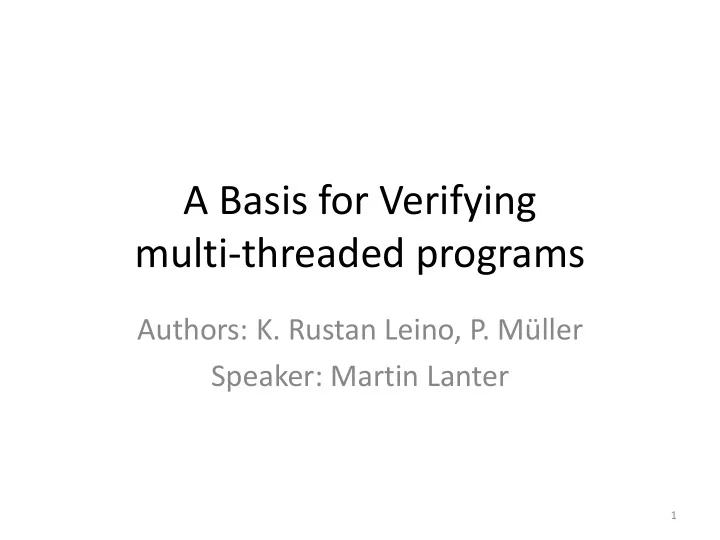

A Basis for Verifying multi-threaded programs Authors: K. Rustan Leino, P. Müller Speaker: Martin Lanter 1
Challenges in multi-threading • Fine-grained locking • Thread-local and shared objects • Distinguish between read and write access • Prevent Deadlocks – Changable locking order • Concurrent programs/data structures must be implemented correctly 2
Verifying multi-threaded programs • Fine grained locking is hard to get right • Verify against contracts – no deadlocks – no data races Chalice Boogie Verifier 3
Permissions • Between 0 and 100% • Permission Holder – Threads – Monitors – System • acc(f, n): n% permission for object f • rd(f): infinitesimal permissions for object f 4
Permissions • Obtain Permission by – Creating a new object (100%) – Acquire an object's monitor (Invariant) – Be forked from another thread (Precond.) – Join another thread (Postcond.) 5
Contracts with Permissions int apple; void bar () int lemon; requires rd(apple) ensures rd(apple) ∧ acc(lemon) void foo () requires acc(apple) { ... } ensures acc(lemon) { apple = 5; bar (); lemon = 7; ... } 6
Sorted Linked List Node: val next sum μ : monitor's position in locking order 7
Sorted Linked List val: -1 4 6 9 sum: 19 15 9 0 Node's invariant: a) acc(next, 100) ∧ rd(val) b) next ≠ null → rd(next.val) ∧ val ≤ next.val c) next ≠ null → acc(next.sum, 50) ∧ sum = next.val + next.sum d) acc(sum, 50) ∧ (next = null → sum = 0) e) acc(μ, 50) ∧ (next ≠ null → acc(next.μ, 50) ∧ μ next. μ) 8
Insert x=7 head val: -1 4 6 9 sum: 19 15 9 0 invariant head ≠ null ∧ acc(head) ∧ acc(head.sum, 50) void Insert(x) requires rd(μ) ∧ maxlock ⊂ μ ∧ 0 ≤ x; ensures rd(μ) ∧ maxlock ⊂ μ ∧ head.sum = old(head.sum) + x; { ... 9
Insert x=7 head p val: -1 4 6 9 sum: 19 15 9 0 acquire this; Node p = head; acquire p; p.sum = p.sum + x; release this; ... 10
Insert x=7 p val: -1 4 6 9 sum: 26 15 9 0 acquire this; Node p = head; acquire p; p.sum = p.sum + x; release this; ... 11
Insert x=7 p val: -1 4 6 9 sum: 26 15 9 0 while (p.next ≠ null ∧ p.next.val < x) // loop invariant { Node nx = p.next; acquire nx; nx.sum = nx.sum + x; release p; p = nx; } ... 12
Insert x=7 p p val: -1 4 6 9 sum: 26 22 9 0 while (p.next ≠ null ∧ p.next.val < x) // loop invariant { Node nx = p.next; acquire nx; nx.sum = nx.sum + x; release p; p = nx; } ... 13
Insert x=7 p p val: -1 4 6 9 sum: 26 22 16 0 while (p.next ≠ null ∧ p.next.val < x) // loop invariant { Node nx = p.next; acquire nx; nx.sum = nx.sum + x; release p; p = nx; } ... 14
Insert x=7 p val: -1 4 6 9 sum: 26 22 16 0 t 7 ... 9 Node t = new Node(x); t.sum = p.next.val + p.next.sum; t.next = p.next; share t between p and p.next; p.next = t; release p; } // Insert(x) 15
Verification • Permission: (p,n) • P[f]: Permission for location f • CanRead(f) ≡ let (p,n) = P[f] in p > 0 ∨ n > 0 • CanWrite(f) ≡ let (p,n) = P[f] in p = 100 ∧ n = 0 16
Field Access 17
Acquiring and Releasing 18
Exhale and Inhale 19
Conclusion • Verification against contracts • Verification methodology – No data races – No deadlocks – Fine-grained locking – Sharing and unsharing of objects – Expressive • Future work: Formal proof of soundness 20
Personal Opinion • Complicated • Great for critical datastructures 21
22
Variables • acc(f, n): n% permission for object f • rd(f): infinitesimal permissions for object f • μ: lock position in locking order u ⊂ v: u's monitor position is strictly less than v • • share, unshare: Functions to share objects between threads • Inhale(J): overtake permissions granted by invariant J • Exhale(J): hand over permissions granted by invariant J • held: true if a thread has acquired an objects monitor • reorder: reorder monitor position between others 𝑞 : list of monitors • • maxlock: maximum position of acquired monitors ⊥ : bottom monitor position • • havoc: assigns an arbitrary value to be constrained by following assume 23
Additional Slides
Additional Slides 25 25
Recommend
More recommend